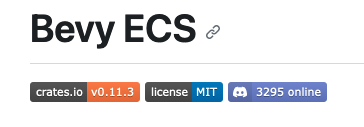# Objective Fix shields ## Solution - Correct shield in the Bevy ECS Readme, where only the MIT license is displayed  - Add shields to other Readmes. - homogenize shields and titles.
40 lines
2.4 KiB
Markdown
40 lines
2.4 KiB
Markdown
# Bevy Tasks
|
|
|
|
[](https://github.com/bevyengine/bevy#license)
|
|
[](https://crates.io/crates/bevy_tasks)
|
|
[](https://crates.io/crates/bevy_tasks)
|
|
[](https://docs.rs/bevy_tasks/latest/bevy_tasks/)
|
|
[](https://discord.gg/bevy)
|
|
|
|
A refreshingly simple task executor for bevy. :)
|
|
|
|
This is a simple threadpool with minimal dependencies. The main usecase is a scoped fork-join, i.e. spawning tasks from
|
|
a single thread and having that thread await the completion of those tasks. This is intended specifically for
|
|
[`bevy`][bevy] as a lighter alternative to [`rayon`][rayon] for this specific usecase. There are also utilities for
|
|
generating the tasks from a slice of data. This library is intended for games and makes no attempt to ensure fairness
|
|
or ordering of spawned tasks.
|
|
|
|
It is based on [`async-executor`][async-executor], a lightweight executor that allows the end user to manage their own threads.
|
|
`async-executor` is based on async-task, a core piece of async-std.
|
|
|
|
## Usage
|
|
|
|
In order to be able to optimize task execution in multi-threaded environments,
|
|
bevy provides three different thread pools via which tasks of different kinds can be spawned.
|
|
(The same API is used in single-threaded environments, even if execution is limited to a single thread.
|
|
This currently applies to WASM targets.)
|
|
The determining factor for what kind of work should go in each pool is latency requirements:
|
|
|
|
* For CPU-intensive work (tasks that generally spin until completion) we have a standard
|
|
[`ComputeTaskPool`] and an [`AsyncComputeTaskPool`]. Work that does not need to be completed to
|
|
present the next frame should go to the [`AsyncComputeTaskPool`].
|
|
|
|
* For IO-intensive work (tasks that spend very little time in a "woken" state) we have an
|
|
[`IoTaskPool`] whose tasks are expected to complete very quickly. Generally speaking, they should just
|
|
await receiving data from somewhere (i.e. disk) and signal other systems when the data is ready
|
|
for consumption. (likely via channels)
|
|
|
|
[bevy]: https://bevyengine.org
|
|
[rayon]: https://github.com/rayon-rs/rayon
|
|
[async-executor]: https://github.com/stjepang/async-executor
|